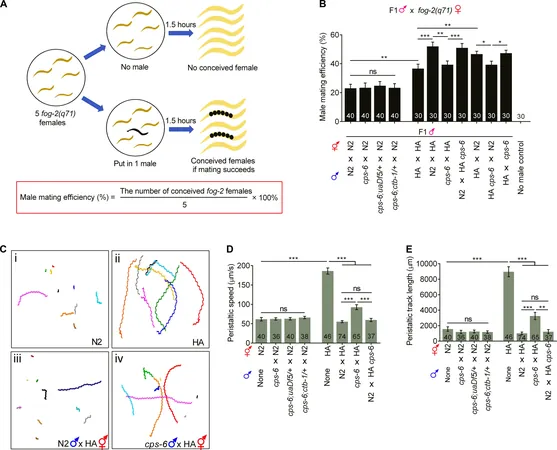
Why You Only Inherit Mitochondria from Mom: Shocking New Study Reveals the Truth
2024-10-09
Author: Amelia
It's a fundamental principle most of us learn in biology class: we inherit our genetic material from both parents. Yet, there's an intriguing twist to this tale when it comes to our mitochondria—tiny structures within our cells that are vital for energy production. Remarkably, we inherit mitochondrial DNA exclusively from our mothers, with the father's contribution vanishing immediately upon fertilization. This phenomenon has baffled scientists for years, but a groundbreaking new study from the University of Colorado Boulder published on October 4 in Science Advances finally offers some clarity.
Unmasking Mitochondrial Mysteries
The study shines a light on the mechanisms that ensure paternal mitochondria are eradicated—a process termed "paternal mitochondria elimination" or PME. Past research by senior author Ding Xue and his team revealed that PME is a sophisticated, self-destruct mechanism specifically designed to prevent the passage of potential genetic defects that sperm might carry after their arduous journey to fertilize the egg.
Now, Xue and colleagues took their research a step further, investigating the aftermath of a failure in this elimination process. By temporarily delaying PME in roundworms, they uncovered alarming reductions in the worms' energy levels, as indicated by decreased ATP production. Those that survived displayed significant issues in cognitive functions, activity levels, and reproductive capabilities.
In an exciting breakthrough, the researchers introduced MK-4, a form of Vitamin K2 noted for its role in bone health. This supplement not only restored ATP levels in embryos but also markedly improved the health and performance of adult worms, hinting at a potential avenue for treating mitochondrial disorders that affect approximately 1 in 5,000 people.
A Glimmer of Hope for Mitochondrial Disorders
While documented cases of paternal mitochondrial DNA presence in humans are rare, this work raises intriguing questions about the underlying reasons for certain mitochondrial disorders. For instance, one case involved a 28-year-old man suffering from muscular weakness and exercise intolerance, while another highlighted multi-generational families grappling with fatigue and neurological symptoms.
Xue speculates that undiagnosed human diseases could arise from similar PME failures. "If you have a problem with ATP, it can impact every stage of the human life cycle," he explains, suggesting that potential solutions could emerge from prenatal Vitamin K2 supplementation for families with histories of these disorders.
This research could change the landscape of understanding and treating mitochondrial diseases, which remain poorly understood and often difficult to diagnose. "This study offers crucial clues in deciphering a complex web of conditions that have long puzzled researchers," Xue asserts.
Bottom Line: The Role of Maternal Mitochondria and Your Health
As we continue to unravel the secrets of human genetics, the importance of maternal inheritance of mitochondria cannot be overstated. This growing body of research serves not just to explain a biological curiosity but could pave the way for innovative preventative measures and treatments for mitochondrial-related ailments. Keep an eye on this field; the future of energy production in our cells may just hinge on our mothers and a simple vitamin.









 Brasil (PT)
Brasil (PT)
 Canada (EN)
Canada (EN)
 Chile (ES)
Chile (ES)
 España (ES)
España (ES)
 France (FR)
France (FR)
 Hong Kong (EN)
Hong Kong (EN)
 Italia (IT)
Italia (IT)
 日本 (JA)
日本 (JA)
 Magyarország (HU)
Magyarország (HU)
 Norge (NO)
Norge (NO)
 Polska (PL)
Polska (PL)
 Schweiz (DE)
Schweiz (DE)
 Singapore (EN)
Singapore (EN)
 Sverige (SV)
Sverige (SV)
 Suomi (FI)
Suomi (FI)
 Türkiye (TR)
Türkiye (TR)